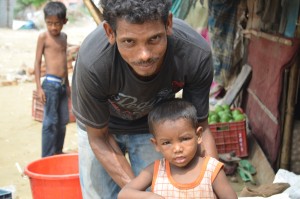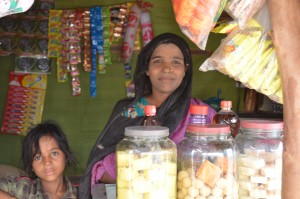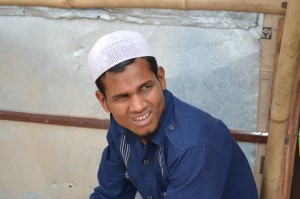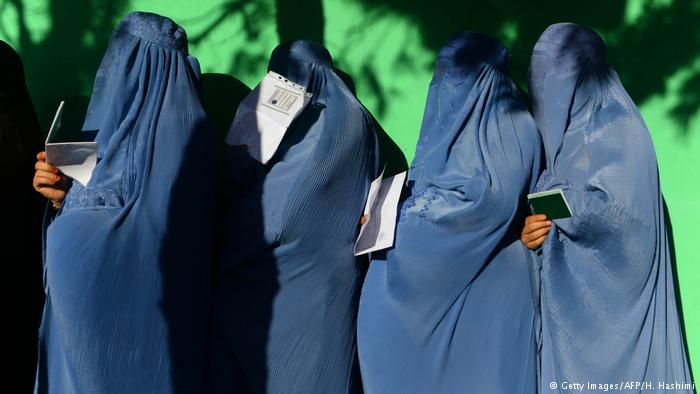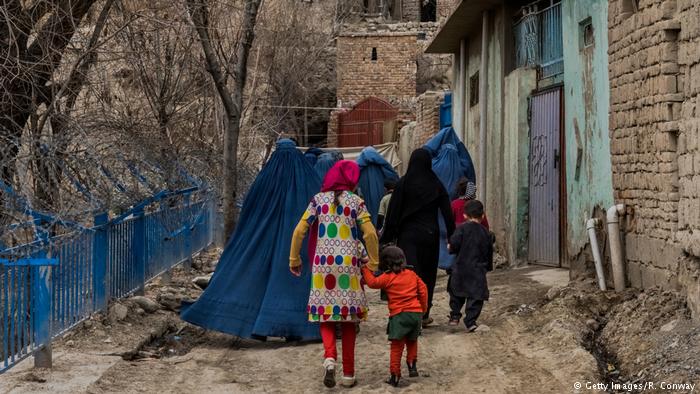The never-ending plight of the Rohingya people
The Rohingyas in Myanmar (a country formerly known as Burma) are often described as one of the most persecuted minorities in the world. From the time the country’s then-military junta passed The Burma Citizenship Law in 1982, they’ve been denied citizenship – and ever since, they are virtually stateless.
Since then they have been living in ghetto-like camps after violence broke out in 2012 in Myanmar’s western Rakhine state.
In their attempt to flee the violence, the Rohingya people have become among the world’s least wanted, denied resettlement in Indonesia, Thailand, Bangladesh, Malaysia or Australia.
Most people here in India use the term “Bengali” which classifies them as illegal immigrants from Bangladesh.
Many of the Muslim minority took to sea to escape their plight; others went overland via the rather porous India-Bangladesh border. An estimated 36,000 Rohingyas are believed to be living in India.
As of the end of December 2014, the latest figures available, just over 17,000 were registered as refugees or asylum seekers with the United Nations High Commission for Refugees or UNHCR.
I went to talk to people at a refugee camp in India’s capital New Delhi. It is a hot muggy afternoon at the Rohingya camp in Kalindi Kunj, in east Delhi.
Minara Begum, 30 years old and a mother of four, is pouring water on the floor in her cramped two room tenement to beat the heat. The frail looking woman is completely exhausted as her youngest child wails.
She arrived in India in 2013. Her risky journey to the Myanmar-Bangladeshi border through mountains, forest and paddy fields took her four weeks. She lived in Bangladesh for another four to five months. She moved to India because she thought it would be safer.
It is difficult for Minara to make ends meet. She gets odd jobs, sometimes working as a domestic help. Her husband, Mukhtar, sells vegetables but that is just about enough to feed the children and live a life of subsistence.
There are more than 40 hutments here, all temporary structures where over 250 Rohingya people live. It is one of several camps in Delhi. Many more are scattered across seven states in India.
The people living in these camps have cards issued by the UNHCR which allow them to stay in India and which must be renewed periodically. But many still have no identity cards which makes life even more difficult.
Minara has learnt to speak Hindi haltingly.
“I will never go back. Things are bad in Myanmar. Our women are harassed and even raped by the military and the Buddhist militia. We have lost everything… our land, livestock and houses. Why go back?” she asks.
In 2012, an estimated 140,000 people were internally displaced within Myanmar and almost 86,000 made the hazardous journey to neighbouring countries, according to the UN.
It was the alleged rape and murder of a young Buddhist woman which sparked that deadly chain of events.
Minara’s friend, Fatima tells me that life has been a living hell.
“At least we can live here though in bad conditions. But it is still a tough life.”
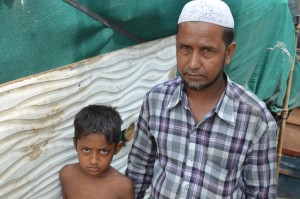
Ajaz Ahmad and Mohammed Haroon – both who fled Mayanmar because their property was seized and relatives attacked by the military junta. © DW/Murali Krishnan
46-year-old Mohammed Haroon also fled the country four years ago when the 2012 fighting happened. He says he has 15 close family members – siblings and cousins – living across camps in India, Bangladesh and even Canada.
“The military junta made life miserable for us. We were robbed and attacked. The junta made us work as forced laborers and beat us mercilessly. They were ruthless,” exclaims Haroon.
Aung San Suu Kyi, Myanmar’s democracy icon who was under house arrest for years during military rule and who led her party to power in last year’s elections, has drawn criticism from rights groups for not taking up the cause of the Rohingya. Minara said she and her family still can’t return to their home. “Even Aung San Suu Ki has not raised her voice in our defence. So where is the question of going back? Only when there is true democracy when our children can be safe and we go back to our homes can we think of Myanmar,” adds Minara.
UNHCR officials point out that many refugees have difficulties in accessing basic services despite being provided with cards.
India is not a party to the 1951 UN Convention on Refugees. Therefore asylum-seekers who are not offered direct protection by the Indian government can get refugee status from the UNHCR but are virtually denied all rights or protection from the state.
It is a complex issue for refugees in India.
Very few families have been able to mingle with the locals here in New Delhi while the rest are seen as ‘Bengali Muslims’ from Bangladesh. But the Rohingyas are not made to feel welcome in Bangladesh, either.
Residents in the camp complain that they are looked upon suspiciously and sometimes find it hard to get work even as daily wage laborers.
“There is no help from the Indian government. They have allowed us to stay here and we have gotten a refugee card status. But there is no financial support,” says Haroon.
“We are one of the most persecuted refugees in the world,” adds his neighbor, Ajaz Ahamad.
The Rohingyas want the Indian government to officially recognize them as refugees. But that would be a slow and long process.
India hosts more than 200,000 foreigners fleeing conflict zones such as in Afghanistan, Tibet, Somalia and Myanmar among others. It has no overarching legal framework that recognizes or protects all refugees.
Author: Murali Krishnan
Editor: Marjory Linardy
_____
WTO RECOMMENDS
Indian women take over ‘men’s sport’
India recently launched its first women professional Kabaddi league. The popular South Asian sport has traditionally been dominated by men but women Kabaddi players say they are out there to demonstrate the ‘girl power.’ (From August 01, 2016)
No ‘safe’ asylum for female refugees in Europe
Female migrants coming to Europe are exposed to physical and sexual violence while living in cramped shelters with other refugees. But cultural prejudices and trauma make it difficult for them to talk about abuse. (From October 13, 2015)
Angela Merkel – Sticking to Her Stance against All Odds
Germany has been facing huge problems in regard to refugees that have been arriving in the country since last year. One might say, all this is caused by Chancellor Angela Merkel’s policy of accepting refugees and refusing to define a maximum number of refugees Germany will allow into the country. In this regard Germany stands very much alone in the European Union. (From March 3, 2016)




